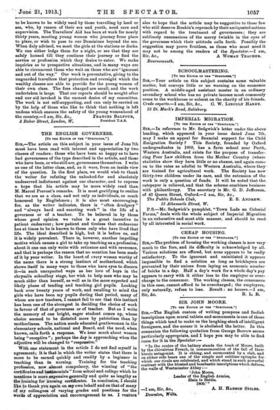THE ENGLISH GOVERNESS.
[To Tux EDITOR Or THE "SPECTATOR.") Sin,--The article on this subject in your issue of June 7th must have been read with interest and appreciation by two classes of readers : those who have been so happy as to have had governesses of the type described in the article, and those who have been, or who still are, governesses themselves. I write as one of the latter class, and, as it were, from an inside view of the question. In the first place, we would wish to thank the writer for refuting the unlooked-for and absolutely undeserved indictment against our character, and to express a hope that his article may be more widely read than M. Marcel Prevost's remarks. It is most gratifying to realize that we are as a class, and not only as individuals, so much honoured by Englishmen ; it is also most encouraging. for, as the writer indicates, there is " often drudgery " and "always hard and exacting work" in the life of a governess or of a teacher. To be believed in by those whose good opinion we value is a great incentive to patient endeavour ; how patient and tireless that endeavour has at times to be is known to those only who have lived that life. The ideal described is high, but it is before us, and it is widely prevalent. There is, however, another impelling motive which causes a girl to take up teaching as a profession; about it one can only write with reticence and with reverence, and that is perhaps the reason that no mention has been made of it by your writer. In the heart of every woman worthy of the name there is a strong instinct of motherhood, which shows itself in many ways to those who have eyes to discern it—in such unexpected ways as her love of boys in the chrysalis schoolboy stage, her wish to help men who may be much older than herself, as well as in the more expected and likely phase of tending and teaching girl pupils. Looking back over twenty years of work, and recalling to mind the girls who have been my pupils during that period, many of whom are now teachers, I cannot fail to see that this instinct has been one of the strongest in deciding the choice of work in favour of that of governess or of teacher. But as I write the memory of one bright, eager student comes up, whose .choice seemed to be dictated more by patriotism than by motherliness. The nation needs educated gentlewomen in the elementary schools, national and Board, and the need, when known, calls forth a response. We hear much about women being "receptive "; perhaps the day is approaching when the adjective will be changed to "responsive."
With one statement in the article I do not find myself in agreement; it is that in which the writer states that there is more to be earned quickly and readily by a beginner in teaching than in nursing. Training for the teaching profession, now almost compulsory, the winning of "the certificates and traoniels " from school and college which he mentions is more expensive generally and quite as lengthy as the training for nursing certificates. In conclusion, I should like to thank you again on my own behalf and on that of many of my colleagues of varying grades and positions for the words of appreciation and encouragement to us. I venture also to hope that the article may be suggestive to those few who still deserve Ruskin's.reproach by their antiquated notions with regard to the treatment of governesses ; they are sublimely unconscious of the merry twinkle in the eyes of the governess which their attitude calls forth. Possibly the suggestion may prove fruitless, as those who most need it may not be among the readers of the Spectator.—I am,










































 Previous page
Previous page